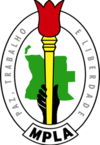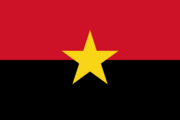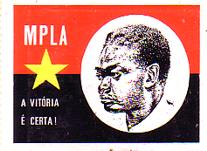MPLA facts for kids
Quick facts for kids
People's Movement for the Liberation of Angola
Movimento Popular de Libertação de Angola
|
|
|---|---|
 |
|
| Abbreviation | MPLA |
| Chairman | João Lourenço |
| Secretary-General | Paulo Pombolo |
| Founders | Ilídio Machado Viriato da Cruz Mário Pinto de Andrade Lúcio Lara |
| Founded | 10 December 1956 |
| Merger of | PLUAA PCA |
| Headquarters | Luanda, Luanda Province |
| Newspaper | Jornal de Angola |
| Youth wing | Youth of MPLA, Agostinho Neto Pioneer Organization |
| Women's wing | Organization of Angolan Women |
| Armed wing | People's Armed Forces of Liberation of Angola (1956–1993) |
| Membership (2022) | 3,000,000 |
| Ideology |
|
| Political position |
|
| International affiliation | Socialist International (since 2006) |
| African affiliation |
|
| Colours | Red |
| Slogan |
|
| National Assembly |
124 / 220
|
| SADC PF |
0 / 5
|
| Pan-African Parliament |
0 / 5
|
| Election symbol | |
 |
|
| Party flag | |
 |
|
The People's Movement for the Liberation of Angola (often called MPLA) is a major political party in Angola. From 1977 to 1990, it was known as the People's Movement for the Liberation of Angola – Labour Party. The MPLA played a key role in Angola's fight for independence from Portugal.
The party fought against the Portuguese Army in the Angolan War of Independence from 1961 to 1974. After Angola gained independence, the MPLA also fought against other groups, UNITA and the National Liberation Front of Angola (FNLA), in the Angolan Civil War. The MPLA has been the ruling party in Angola since the country became independent in 1975.
Contents
How the MPLA Started
The MPLA was formed on December 10, 1956. It brought together two main groups: the Party of the United Struggle for Africans in Angola (PLUAA) and the Angolan Communist Party (PCA). Leaders like Viriato da Cruz, Ilídio Machado, and Mário Pinto de Andrade helped create the movement.
These leaders wanted to unite different groups fighting for Angola's freedom. They wrote a document called the "Manifesto of 1956." This document called for a "broad Popular Movement for the Liberation of Angola" to bring together all nationalist efforts.
The MPLA's main supporters came from the Ambundu ethnic group and educated people in the capital city, Luanda. The party's armed group was called the People's Armed Forces for the Liberation of Angola (FAPLA). This group later became Angola's national army when the MPLA took control of the government in 1975.
In the early 1970s, the MPLA faced challenges, including internal disagreements that caused the movement to split for a short time. However, by 1974, the groups came back together.
Independence and Civil War
In 1974, a change in government in Portugal led to an agreement to give power to three Angolan independence movements. However, this agreement quickly fell apart, and Angola entered a civil war.
On November 11, 1975, Agostinho Neto, the leader of the MPLA, declared Angola's independence. The MPLA controlled Luanda and the valuable oil fields along the coast. Agostinho Neto became Angola's first president. After he passed away in 1979, José Eduardo dos Santos became president.
During the civil war, different countries supported the opposing sides. South Africa and Zaire helped UNITA and FNLA. The United States also supported these two groups. On the other side, Cuba and the Soviet Union helped the MPLA government.
In 1977, at its first big meeting, the MPLA decided to follow Marxism–Leninism as its main idea. It also added "Labour Party" to its name. After a difficult period of internal conflict, the MPLA decided to follow a socialist path, not a communist one. They kept strong ties with the Soviet Union and other communist countries. They also set up a one-party state, meaning only one political party was allowed. Thousands of Cuban troops stayed in Angola to help the government fight UNITA.
When the Cold War ended and the Soviet Union broke up, the MPLA changed its ideas again. In 1990, it declared social democracy as its official way of thinking. This means they believe in a mix of democracy and social programs to help people.
The MPLA won the 1992 general election in Angola. However, some opposition parties said the election was unfair. This led to more fighting, and the civil war started again. The war continued until 2002, when UNITA leader Jonas Savimbi was killed. The two sides then agreed to stop fighting, and UNITA became a political party. The civil war caused the deaths of many people.
Human Rights Concerns
The MPLA government has faced accusations of not always respecting human rights from international groups like Amnesty International and Human Rights Watch.
MPLA Organizations
The MPLA has several important organizations that work with different groups of people:
- The Angolan Women's Organization (O.M.A.)
- The National Union of Angolan Workers (U.N.T.A.)
- The Agostinho Neto Pioneer Organization (O.P.A.), for young people.
- The Youth of MPLA (J.M.P.L.A.), for young members.
International Support for MPLA
During the wars, the MPLA received help from many countries. This support included military aid and humanitarian help. Some of the countries that supported the MPLA were Algeria, Brazil, Cuba, East Germany, Nigeria, North Korea, and the Soviet Union.
Elections in Angola
The MPLA has participated in several elections in Angola. In the 1992 election, the MPLA won the most votes and seats in parliament. However, some opposition parties claimed the election was not fair. In the 2008 election, the MPLA won a large majority of the votes and parliamentary seats. In the 2012 election, the party continued to win a strong majority. In the 2022 general election, the MPLA won 124 parliamentary seats and about 51% of the votes. This was a closer election than in previous years.
Presidential Election Results
| Election | Party candidate | Votes | % | Result |
|---|---|---|---|---|
| 1992 | José Eduardo dos Santos | 1,953,335 | 49.57% | Elected |
| 2012 | 4,135,503 | 71.85% | Elected |
|
| 2017 | João Lourenço | 4,907,057 | 61.08% | Elected |
| 2022 | 3,209,429 | 51.17% | Elected |
National Assembly Election Results
| Election | Party leader | Votes | % | Seats | +/– | Position | Result |
|---|---|---|---|---|---|---|---|
| 1980 | José Eduardo dos Santos | Indirect election |
229 / 229
|
New | Sole legal party | ||
| 1986 | Indirect election |
173 / 290
|
Sole legal party | ||||
| 1992 | 2,124,126 | 53.74% |
129 / 220
|
Majority government | |||
| 2008 | 5,266,216 | 81.64% |
191 / 220
|
Supermajority government | |||
| 2012 | 4,135,503 | 71.85% |
175 / 220
|
Supermajority government | |||
| 2017 | João Lourenço | 4,907,057 | 61.08% |
150 / 220
|
Supermajority government | ||
| 2022 | 3,209,429 | 51.17% |
124 / 220
|
Majority government | |||
See also
 In Spanish: Movimiento Popular de Liberación de Angola para niños
In Spanish: Movimiento Popular de Liberación de Angola para niños
- African independence movements
- History of Angola
- Mário Pinto de Andrade
 | Charles R. Drew |
 | Benjamin Banneker |
 | Jane C. Wright |
 | Roger Arliner Young |


